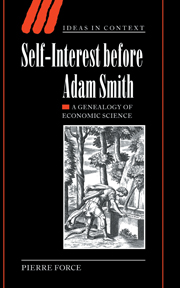Book contents
3 - Self-interest and reason
Published online by Cambridge University Press: 22 September 2009
Summary
Man is an indifferent egoist: even the cleverest regards his habits as more important than his advantage.
Nietzsche, Fragments of 1887–1888THE RATIONAL PURSUIT OF SELF-INTEREST
According to Amartya Sen, standard economic theory defines rational behavior in two different ways: “One is to see rationality as internal consistency of choice, and the other is to identify rationality with maximization of self-interest.” Sen adds that, “in terms of historical lineage, the self-interest interpretation of rationality goes back a long way, and it has been one of the central features of mainline economic theorizing for several centuries.” Having discussed the status of self-interest as a first principle, we still need to explain what economists mean by “the rational pursuit of self-interest.” In order to do this, we must understand the genealogy of the association between reason and self-interest.
The leading advocate of the “economic approach” claims that a comprehensive account of human behavior can be grounded in a set of related assumptions: (a) maximizing behavior; (b) market equilibrium; (c) stable preferences. In Becker's view, these assumptions, “used relentlessly and unflinchingly, form the heart of the economic approach.” The assumption of “maximizing behavior” means that we do not behave inconsistently. As Elster puts it, once a set of beliefs is assumed, our behavior is considered “maximizing behavior” when it is “the best action with respect to the full set of weighed desires.
- Type
- Chapter
- Information
- Self-Interest before Adam SmithA Genealogy of Economic Science, pp. 91 - 134Publisher: Cambridge University PressPrint publication year: 2003
- 1
- Cited by



